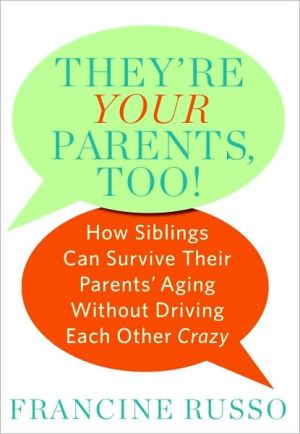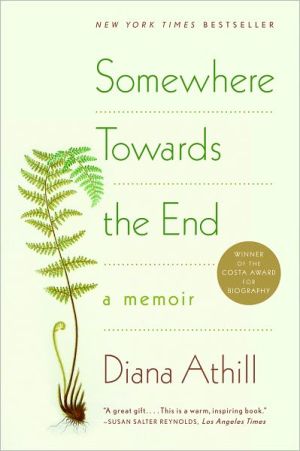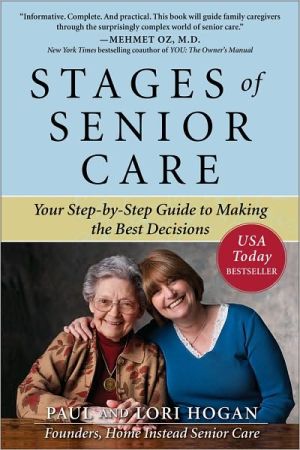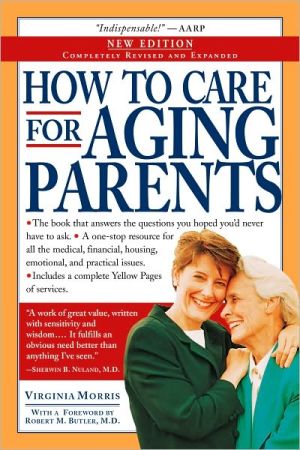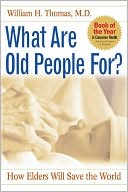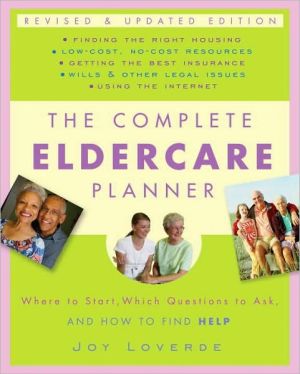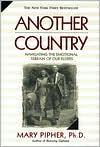They're Your Parents, Too!: How Siblings Can Survive Their Parents' Aging Without Driving Each Other Crazy
Your parents are growing older and are getting forgetful, starting to slow down, or worse. Suddenly you find yourself at the cusp of one of the most important transitions in your life—and the life of your family. Your parents need you and your siblings to step up and take care of them, a little or a lot. To make the right things happen, you will all need to work together. And yet your siblings may have very different ideas from yours of what’s best for Mom and Dad. They may be completely...
Search in google:
Your parents are growing older and are getting forgetful, starting to slow down, or worse. Suddenly you find yourself at the cusp of one of the most important transitions in your life—and the life of your family. Your parents need you and your siblings to step up and take care of them, a little or a lot. To make the right things happen, you will all need to work together. And yet your siblings may have very different ideas from yours of what’s best for Mom and Dad. They may be completely uninterested in helping, leaving you with all the responsibility. Or they may take charge and not allow you to help, or criticize whatever help you do give. Will you and your siblings be able to reach an understanding and work together, or will the challenges you face tear you apart? Most of us enter this period of our lives unprepared for the difficult decisions and delicate negotiations that lie ahead. This is the first book that provides guidance on the transition from the “old” family to the “new” one, especially for adult siblings. Here you’ll find practical advice on a wide range of topics including • Who will make major medical decisions, manage finances, and enforce end-of-life choices if your parents cannot? And how will this be decided and carried out?• How will you negotiate caregiving issues and deal with unequal contributions or power struggles? • How can inheritance and the division of property, assets, and personal effects be handled to minimize hurt feelings and resentment?• How will you cope with the natural reemergence of unresolved childhood rivalries, hurts, and needs?• How can caring for your parents be an enriching experience rather than a thankless chore?• Most important, how can you ensure the best care for your parents while lessening conflict, guilt, anger, and angst? Written by a veteran journalist who chronicles life and how baby boomers live it, They’re Your Parents, Too! offers all the information, insight, and advice you’ll need to make productive choices as you and your siblings begin to assume your parents’ place as the decision-making generation of your family. Filled with expert guidance from gerontologists, family therapists, elder-care attorneys, financial planners, and health workers; resonant real-life stories; and helpful family negotiation techniques, this is an indispensable book for anyone whose parents are aging. Library Journal In this painful but effective book, journalist Russo explores what she calls the "twilight transition," when the end of the family as one knew it is near, and one intensely reengages with siblings. This period—which many boomers are living or entering—is laden with new challenges: adapting to a new adult role, confronting old sibling conflicts, and making peace with the loss of parents. Once again, readers are asked to understand one another and look at things through others' eyes. Russo also covers the "posttwilight" period, when one needs to mourn, move on, and sustain family connections into the future. More than a how-to book, this groundbreaking work illuminates a difficult stage of life.
Chapter One\ THE LAST TRANSITION OF OUR FIRST FAMILY\ \ DOTTIE, FIFTY-SEVEN, A LIBRARIAN and local historian, and Arlene, fifty-five, a financial planner, brought their cars around to the rutted front drive of the old Kansas farmhouse to move their mother to the assisted living home. Mrs. Keller, an impressively tall ninety- one-year-old woman, hobbled out on her cane, her face stony. Her daughters each took a deep breath. This moment was the climax of a year of contentious family meetings and a decade of seismic shifts in their family since their father’s death.\ Once their mother was widowed, their brother Donny, fifty-two, had taken the lead because he was there; he’d continued their dad’s pet- supply business and helped out their mom with chores. The four sisters, at various distances and busy with families and careers, saw their mother more regularly than before. At first these were the only differences, but then the pace of change accelerated: Mom’s fender bender in the grocery parking lot, several falls she took in the decrepit house, an oven mitt on fire in the oven. The five siblings gathered for a series of family meetings in Donny’s living room to figure out what to do. Usually having all five together was a cause for joy, but not this time. Several thought Mom should move out for her own safety. Opinions differed. Tears were shed. Yet through it all they worked hard to reach a consensus. Dottie was the last to agree to the move, three months after her siblings. “I got sucked into it,” she admitted, “taking Mom’s side, that she should die in that house. I couldn’t see how she’d changed. She was the mother of my past, my comfort. I couldn’t let that go.”\ Once the decision was made, the siblings worked together: finding the right place and then persuading Mom, applying firmness and the gentle persuasion of a family prayer meeting. On their own schedules, each spent hours packing up. During that time the siblings felt close, as they would again in the future. But when the critical moment arrived, each was swept up in tumultuous feelings.\ Dottie, a sweet-tempered woman with unruly curls, was chafing because her younger sister, was taking charge. She was floored when Arlene, crisp and efficient, declared, “Mom will go in the car with me. You follow.”\ “I just shut down,” Dottie said, “and my sister rolled over me and my feelings by sheer force of personality.”\ For Dottie, it was hard not being with her mother for this momentous ride. For Arlene, sitting at the wheel and seeing her mother’s stricken expression was awful. “Mom,” she asked before she pulled out, “would you like to say a prayer?” Her mother nodded.\ “Lord,” the older woman prayed, “please give me the courage to accept where I am going to live.” Arlene started the car and drove silently, swept with admiration for her mother and grief for what they were losing. As soon as they got there, she channeled her emotions into a whirl of activity, setting up her mother’s new home in the assisted living center.\ When Dottie arrived, Arlene was in a frenzy of hanging pictures. Dottie stood there gaping. She’d taken photos of the farmhouse walls to help place the pictures in a familiar way. Now she froze, unable to help. Then, one after the other, their sisters showed up and shouted that Mom said she wanted a different picture up.\ “But Mom just told me she didn’t want that one now,” Arlene repeated with increasing desperation.\ Finally Arlene just walked out. “I couldn’t take it anymore,” she said. “I was working so hard to make it good for my mother, and they criticized everything I did. The feelings just got to me. This was the end of a huge part of my life, my mom moving out of the place where I grew up, that was in our family for sixty years. It was huge.”\ Dottie felt even worse, especially after Donny took Arlene outside alone to talk business, seeming to exclude the rest of the family. The next day, Dottie took off to camp in the woods alone. “It was so hard to come out of that terrible deep hole,” she said. “It took me weeks to recover.”\ A FAMILY REUNION UNLIKE ANY OTHER\ Like so many of us, these siblings were struggling through one day in the long developmental transition of their original family. As we come together to deal with the needs of our aging parents, sweeping emotions like theirs—anger and helplessness, childlike needs and rivalries in tandem with mature\ behavior and life-changing decisions—often go with the territory. As we are thrust into prolonged and intimate contact with our sisters and brothers after decades in separate homes and lives, all our family history crashes down on us as we each look mortality in the face, up close—our parents’ and our own.\ “It’s like being put down with your siblings in the center of a nuclear reactor and being told, ‘Figure it out,’” Sara Honn Qualls told me. The University of Colorado geropsychologist, a practitioner in the emerging field of the psychology of aging, is one of a host of experts who have embarked on trying to understand this late-life convergence of the family.\ This transition unfolds over several years, even decades, as we and our siblings reunite around our aging parents and their new needs. Over time we share or resist responsibilities for their health, well- being, and property, making decisions from the mundane to the literally life-and-death. But the twilight is not only a matter of solving practical problems and meeting practical needs. It is an existential crisis through which we will be transformed from the children of our parents to the elders of our family. It requires a critical recalibration of our sense of who we are and what our family is. It demands that we accept change and grow as people. How we navigate this passage with our siblings determines, in large part, whether we remain a connected family after our parents die, and what our connection will be like.\ Just think about the enormity of this. Decades of life and change, the addition of partners and children, have made us different people from the sons and daughters, sisters and brothers we were. One of our parents is probably gone; both may be frail. Making our original family work together at this point can be like trying to crunch together a machine from a group of scattered and reshaped parts. It just doesn’t function the way it used to; we have to adapt what we’ve got to make it run. Even harder, our parents’ decline and dependency evokes powerful emotions from our earliest days, feelings that pull us backward when we need most desperately to push forward and be more adult than we’ve ever been.\ The Kellers’ reactions are typical. Before they reassembled to deal with their increasingly frail mother, they had all gone different ways. There were marriages, divorces, remarriages, kids, and grandkids. By the time Dottie moved back to their hometown, twice- divorced and still a dreamy romantic, her younger sister, Arlene, had become a player in their town, a trusted financial adviser and confident leader. As Dottie found out, being older didn’t count for much anymore. Many things about these people and their relationships were different. As they confronted their mother’s new dependency, and glimpsed her mortality, they found themselves acting out of old needs, reenacting old rivalries. They felt sad, angry, hurt, and confused. Yet, as I can attest after interviewing scores of siblings from twilight families, the Kellers did reasonably well overall.\ These Kansas siblings are pioneers: We all are. “There are no role models for this,” social worker Lynn Cibuzar told me. She and I were sitting at the conference room table of DARTS, a Minneapolis-area nonprofit serving seniors and their families. Cibuzar had led countless family meetings around that table to help beleaguered and conflicted sibling groups, with or without their parents, to hammer out how to work together, both for their parents’ sake and for one another’s, as they coped with everything from elder care and housing to powers of attorney, from medical decisions to inheritance. “As families,” Cibuzar lamented, “we have no models for this. We’re all struggling through something new. I tell people, ‘This is not just your sister’s fault. We have to see the bigger picture, all the forces that have brought us here.’”\ NEW TIMES, NEW KINDS OF FAMILIES\ One or two generations ago, the Keller family would probably not have gone through this long renegotiation of their family relationships over their parents’ old age. The odds are overwhelming that their mother would not have lived to be so old. But if she had been one of the rare old people, she would probably have been healthy, then died after a brief illness. If she needed assistance longer, an unusual occurrence, one of her homemaker daughters would have cared for her. There were no senior housing, assisted living, or continuous care centers. There was a mere handful of “old age homes.”\ “It was a barren landscape,” Elaine Brody told me. In 1957, this pioneering gerontologist was doing intake interviews at one of these few old age homes. The word caregiving did not exist then, she told me. Most old people were poor; the Social Security Act of 1935 came too late to help them when they could no longer work. In fact, many states had (and still have on the books) laws requiring their “legally responsible relatives”—their children—to support them. Over the following decades, the Philadelphia Geriatric Center, as this old age home came to be called (it has since been reconstituted as the Abramson Center for Jewish Life and the Polisher Research Institute), established a number of firsts: an apartment building for old people, geriatric hospital, assisted living center, and, in 1974, a model Alzheimer’s facility.\ In the 1970s, Penn State gerontologist Steven Zarit, then a young professor at the University of Southern California, witnessed the first swell in the elderly population while operating a community counseling program for the Andrus Gerontology Center in Los Angeles. The children of people with dementia begged Zarit to help because they had nowhere else to turn.\ Many old people themselves were surprised to be alive. “I never thought I’d live this long,” bemused old folks told social workers. In fact, as Purdue University family studies expert Karen Fingerman noted, the parents of baby boomers, our parents, were the first generation in history to experience old age as a normal stage of life. They were the first to enjoy the benefits of social security and to look forward to retirement; the first to move far from home to enjoy it.\ The New Old People\ During the twentieth century, the average person’s life expectancy shot up by three decades. Thirty more years of life! Between 1950 and 2000, the percentage of people seventy-five and older doubled from 3 to 6 percent of the U.S. population, and people over eighty-five are now the fastest-growing demographic group.\ When our grandparents or great-grandparents got sick, they usually died quickly from infectious diseases, such as influenza or diphtheria. Or they died from mostly untreatable conditions, such as heart disease, ulcers, or cancer. It was our parents who saw the invention of antibiotics to treat the diseases that used to kill people. They were among the first to receive new vaccines to ward off killer epidemics, such as cholera and smallpox. Better nutrition, health information, water, and sanitation also helped keep them alive. Then the introduction of Medicare in 1965 gave them unprecedented access to medical care.\ Because of medical advances in the treatment of chronic health conditions, more and more of our parents have been able to survive into old age. But there’s a dark side to this progress. Those who get to be very old, whose numbers are increasing rapidly, have a much greater probability of developing Alzheimer’s or another dementia. More than 40 percent of people over eighty-five are now afflicted, according to the Alzheimer’s Association. These revolutionary changes mean that most of our parents need or will need some kind of care, probably for years. We are the ones who will care for them—34 million of us currently, according to the National Alliance for Caregiving, AARP, and MetLife.\ The New Adult Children\ \ On the other side of this social revolution, today’s midlife adults, beginning with those of us born between 1946 and 1964 and defined as baby boomers, are dramatically different as adult children from those in previous generations. We grew up in tremendous prosperity in what scholars tell us were the most child-centered homes in history until that time. We became the best-educated generation. Better education in turn prompted many of us to move far from home, first for college, then for career, and newly accessible air travel facilitated these moves. At least half of us live fifty miles or more from our parents. This makes us the first native-born generation, Fingerman observed, whose relationships with our parents have been so affected by geographic distance.\ Sweeping social changes have also shaped our generation. The women’s movement, which made it normal for women to work, collided with the traditional assumption that women would be responsible for caring for their parents. Certainly, today’s daughters are less available for caregiving. Male or female, we are also less on hand because of new kinds of family lives and career trajectories. Many of us have had our children later and are still raising kids when our parents get old, hence the “sandwich” generation. With more divorce and remarriage, more single-parent families and untraditional kinds of households, increasing numbers of boomers are juggling more competing responsibilities with supercharged demands.\ All these historical developments complicate our relationships with our aging parents. Although studies show that we remain emotionally close even when we live far away, physical distance can add tensions to our relationships because we cannot always give our parents the time and attention they would like or we might like to give them. Moreover, many of us became better educated than our parents, and this difference is yet one more factor with the potential to create emotional distance between us as well as physical. Ambivalence in our relationships is common.\ The culture in which we were brought up has also given us a sense that we have control over the important things in our lives. We are problem solvers. If something is broken, we are convinced we can fix it. Are we, therefore, psychologically prepared for the aging of our parents? Those who have studied us, such as Brandeis University researcher Margie Lachman, say that we enter midlife with a sense of mastery of our world. But most of us also enter midlife with at least one living parent. What happens between this point and our last parent’s death profoundly challenges our sense of mastery.
\ Library JournalIn this painful but effective book, journalist Russo explores what she calls the "twilight transition," when the end of the family as one knew it is near, and one intensely reengages with siblings. This period—which many boomers are living or entering—is laden with new challenges: adapting to a new adult role, confronting old sibling conflicts, and making peace with the loss of parents. Once again, readers are asked to understand one another and look at things through others' eyes. Russo also covers the "posttwilight" period, when one needs to mourn, move on, and sustain family connections into the future. More than a how-to book, this groundbreaking work illuminates a difficult stage of life.\ \
